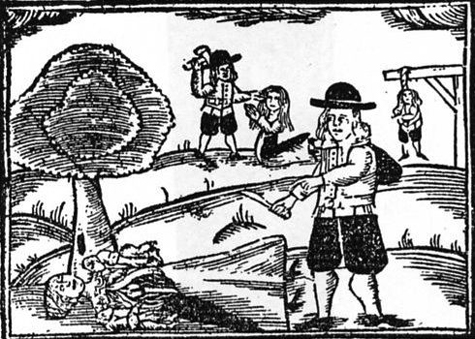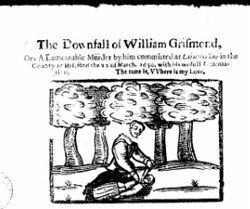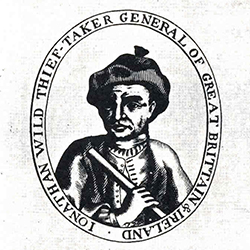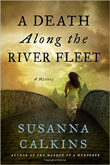
Read this exclusive guest post from Susanna Calkins about 17th-century murder ballads, and then make sure you're signed in and comment for a chance to win a copy of Susanna's book, A Death Along the River Fleet!
The murders in my Lucy Campion mysteries are largely described through ballads, broadsides, and other penny pieces, which is how 17th-century Londoners would have learned about crimes within their community.
Long before modern tabloids sensationalized criminal activity, such “true accounts” of murders offered sordid and titillating details of the crime, the victim's last hours, and the murderer’s motivations.
In the penny press, murderers were commonly referred to as “monsters”—real human beings who had crossed society's lines, having committed murder or other unspeakable acts. Implicit in many of these true accounts was a warning—less to future victims, and more to society at large—that monsters walked among them. Though masked and disguised as humans, their monstrous nature would come out, and they would, by necessity, be caught. And the underlying message of these murderous accounts was certainly clear:
Woe to the community who did not catch and put an end to these monsters.
Interestingly, the humanity of these monsters could only be restored by execution, usually by public hanging. So, on days when criminals were scheduled to be executed, their “last dying speeches” would be sold either at Newgate Prison or at the Tyburn Tree (the site of the hanging). In these speeches, the murderers would recount—and sometimes repent—their journeys to evil and the treacherous acts committed upon their victims.
(Ironically, the early modern crowds who gathered to watch these public executions—men, women, and children who cheered on the criminals' grim ends—were not themselves considered to be monsters, despite their bloodlust and fascination with the gallows. But hey, people aren't always consistent, are they?)
Booksellers and printers understood and regularly exploited these sentiments, tapping into the public's fears, passions, and anxieties about crime and disorder, and the need for the community to bring monsters to justice—responding to and connecting with a very morbid sense of humor that pervaded the community at this time.
Very often, murder was literally described in verse, sung by booksellers on street corners, in a sort of a half-fictional, half-truthful way.
Take, for example, this 1660s ballad that I chose at random from the Early English Books—a large collection of penny press from the 16th to the 19th centuries.
 As always, the title provides a synopsis to the reader (or listener, as neighbors and friends would read these ballads out loud):
As always, the title provides a synopsis to the reader (or listener, as neighbors and friends would read these ballads out loud):
The Downfall of William Grismond: or, A lamentable murder by him committed at Lainterdine in the county of Hereford, the 22 of March, 1650, with his woful [sic] lamentation.
If you just look at the first part, you'll see the author specifies that the murder ballad should be sung to the tune of “Where is my love.”
(Ironic, of course, given that his love is lying on the ground, having been murdered at his hands. The audience would have gotten the joke. I think it is hilarious).
But the point is, the story of this murder wasn't just simply meant to be read, but rather sung according to a well-known, popular tune. I always joke with other authors and booksellers that we are quite lucky that we don’t have to sing our books to our audiences…
My own mysteries were inspired by ballads I had come across that repeatedly told the same type of a story: This was the story of a young woman found strangled or stabbed in a secluded glen. In her pocket, there was always a note that would say something like, “My dearest sweetheart. Please meet me at stile at midnight.” And then, it would be signed with a man’s name, say, John, or with his initials.
Then, when her body was found and the note was discovered, neighbors would say, “Hey, we know John,” and they’d go round him up, get him arrested, and thrown in the local jail. After he came to trial, inevitably he would be found guilty, and then hanged later.
This always raised questions for me: Who was this woman? Had this man been framed? These questions eventually became the backdrop of my first novel, A Murder at Rosamund’s Gate.
Throughout my novels, I bring in clues from both real and made-up ballads and true accounts that my sleuth, Lucy, drew upon to solve the murders. I always thought it was reasonable that someone could find clues in these kinds of stories.
Putting this to the test, here’s another ballad, with a long title that still tells the story:
Newgate's Garland: Being a New Ballad shewing How Mr. Jonathon Wild's throat was cut, from ear to ear, with a penknife by Mr. Blake, alias Blueskin, the bold highwayman, as he stood at his trial at the Old Bailey.
Written by Anonymous, the ballad contained instructions that it was “to be sung to the tune of ‘The Cutpurse.’ ”
 This ballad recounts the sensationalized but true story of Jonathon Wild, who worked both sides of the law—serving as a professional thief-taker (bounty-hunter), while running a successful criminal enterprise at the same time. The backstory is that after Wild was initially arrested for debt in 1710, he began to do small tasks for the jailers in a highly corrupt prison environment. He was even allowed to leave the prison for short periods to run errands. Over time, he became so trusted by authorities, that he became a successful thief-taker, bringing countless criminals to prison.
This ballad recounts the sensationalized but true story of Jonathon Wild, who worked both sides of the law—serving as a professional thief-taker (bounty-hunter), while running a successful criminal enterprise at the same time. The backstory is that after Wild was initially arrested for debt in 1710, he began to do small tasks for the jailers in a highly corrupt prison environment. He was even allowed to leave the prison for short periods to run errands. Over time, he became so trusted by authorities, that he became a successful thief-taker, bringing countless criminals to prison.
He became so well known that Great Britain's Privy Council even consulted with him on the best way to reduce crime in the country! His answer, not surprisingly, was to raise the reward given to thief-takers, suggesting that instead of the customary forty pounds per criminal, to a hundred pounds each.
Yet, even as Wild publicly brought criminals to justice—by some accounts, the count may have been close to fifty—he was also running a large criminal operation of his own.
Wild did very well for himself for quite some time, but his luck turned sour when he was caught helping some of his men break out of prison. Brought to trial, he was mocked roundly by thieves. It was at this point that Blueskin took that near-fatal swipe at him described in the ballad.
Ye fellows of Newgate, whose fingers are nice,
in diving in pockets, or cogging of dice,
Ye Sharpers so rich, who can buy off the noose,
Ye honester poor rogues, who die in your shoes,
Attend and draw near,
Good news ye shall hear,
How Jonathan's throat was cut from ear to ear,
How Blueskin's sharp penknife shall set you at ease,
and every man round near me, may rob if they please.
One point of accuracy however: Wild was not killed by the swipe of the knife, as the ballad implies, even though a “merry garland” (the slash of blood) was left about his throat. Later accounts rectify this mistake, reveling in Wild’s final moments.
According to other True Accounts, the crowds were so eager to see Wild executed that they waited for hours before he was scheduled to arrive. Along the way to the Tyburn Tree, Wild was subject to great physical and mental abuse, even having rotting animals and feces thrown upon him as he was carted towards his hanging. He seems to have been dazed and disoriented by the time he emerged from the cart. After he died, apparently his body was stolen, illegally dissected by surgeons, and ended up on display at the Hunterian Museum in London.
Later, the novelist Henry Fielding—who as a young man was among the spectators of Wild's execution—parodied the man's life and death in the fictionalized History of the Life of the Late Mr. Jonathon Wild the Great (1745).
So clearly, I’m not the only novelist inspired by these Strange and Most Terrible Accounts from the annals of real history.
Comment below for a chance to win a copy of A Death Along the River Fleet by Susanna Calkins!
To enter, make sure you're a registered member of the site and simply leave a comment below.
TIP: Since only comments from registered users will be tabulated, if your user name appears in red above your comment—STOP—go log in, then try commenting again. If your user name appears in black above your comment, You’re In!
 A Death Along the River Fleet Comment Sweepstakes: NO PURCHASE NECESSARY TO ENTER OR WIN. A purchase does not improve your chances of winning. Sweepstakes open to legal residents of 50 United States, D.C., and Canada (excluding Quebec), who are 18 years or older as of the date of entry. To enter, complete the “Post a Comment” entry at https://www.criminalelement.com/blogs/2016/04/a-true-account-of-a-most-monstrous-act-and-other-strange-happenings-comment-sweepstakes beginning at 1:00 p.m. Eastern Time (ET) April 29, 2016. Sweepstakes ends 12:59 p.m. ET May 6, 2016. Void outside the United States and Canada and where prohibited by law. Please see full details and official rules here. Sponsor: Macmillan, 175 Fifth Ave., New York, NY 10010.
A Death Along the River Fleet Comment Sweepstakes: NO PURCHASE NECESSARY TO ENTER OR WIN. A purchase does not improve your chances of winning. Sweepstakes open to legal residents of 50 United States, D.C., and Canada (excluding Quebec), who are 18 years or older as of the date of entry. To enter, complete the “Post a Comment” entry at https://www.criminalelement.com/blogs/2016/04/a-true-account-of-a-most-monstrous-act-and-other-strange-happenings-comment-sweepstakes beginning at 1:00 p.m. Eastern Time (ET) April 29, 2016. Sweepstakes ends 12:59 p.m. ET May 6, 2016. Void outside the United States and Canada and where prohibited by law. Please see full details and official rules here. Sponsor: Macmillan, 175 Fifth Ave., New York, NY 10010.
To learn more or order a copy, visit:
opens in a new window![]() opens in a new window
opens in a new window![]() opens in a new window
opens in a new window![]() opens in a new window
opens in a new window![]()
Susanna Calkins became fascinated with seventeenth-century England while pursuing her doctorate in British history and uses her fiction to explore this chaotic period. Originally from Philadelphia, Calkins now lives outside of Chicago with her husband and two sons.A Death Along the River Fleet is her fourth novel.

It has always amazed and worried me at how blood thirsty the public can be. I cannot imagine going to a public exicution, let alone bringing a child with me. One’s life should never be that boring or empty that watching someone die is considered entertainment.
Reading mysteries and thrillers to me is a bit more about suspense and justice. Seeing the process of finding the guilty party and getting justice for the victims. It isn’t necessary to watch their demise.
Enter me in this giveaway. Had forgotten the purpose of ballads in other centuries was to spread infamous news and stories of other regions. Didn’t realize that also included murderers and other types of criminals.
Thanks for this fascinating post and the novel sounds intriguing and unforgettable.
The National Enquirer has a long history!
Ballads are extremely interesting. What a great post.
My nephew is interested in sea chanteys. I bet he’d find these ballads equally fascinating. A very interesting post. Thank you.
[b]Sounds like a great ballad.[/b]
My Dad loves this kind of thing. Thanks for the interesting information and the opportunity to win.
This mystery takes a different approach than I have read. Sounds interesting.
The only public executions I want to attend are those of child abusers.
Old and new! Yes!
This mystery takes a different approach than I have read. Sounds interesting.
“Merry garlands” and all. The public and reporters came up with a fun name to describe an atrocious act, as if they welcomed the thought of such crimes just so they could, having missed the opportunity to witness the actual murder itself, look gleefully forward to the perpetrator’s execution. I guess without TV or the internet, viewing pleasures came in unusual packaging!
I can’t wait to read this.
Love the sound of the book, its something i could dive into.
After having my television on all day, every day, it might be a pleasant distraction to have the news of murders announced by way of a song!
The book sounds very interesting, would love to win a copy!
A very interesting post. I guess public executions were considered family entertainment back then. The book sounds good. I’d love to give it a read.
I would love to read the book.
This sounds very interesting.
Yes, please count me in for this sweepstakes.
Thanks —
Love to read!
I love ballads of all the ages.
The block prints are great!
Hello, History is capable of so much. Perhaps, it would help mankind to learn from mistakes made in the past… I am curious – Were there serial killers during the time that you spoke about? Or, did the notes found on the victims give away the criminal too soon?!
Thank you very much for educating me in your interesting question and answer time.
Cindi
Very interesting discussion. I wish I knew the tunes of the songs she speaks of . I bet her book is really interesting.
thanks the book sounds interesting
I am fascinated by history, and for some reason, British history, so this article was fantastic. I especially loved how stories were available to all by these means–especially since I don’t think that many people actually could read around that time. It would really be cool if I could win this book–to start a whole new genre of mystery to pleasure the mystery buff in me.
It is a good thing authors don’t sing their books. I doubt that I could stand to listen that long.
This is a new author for me. I’m looking forward to reading her work. Thanks for the ss
Count me in, please!
How fascinating to learn something new about these old songs! I hadn’t heard of murder ballads before. I think I’m glad that authors and booksellers don’t have to sing them anymore. I love the idea of taking these old songs and using them for inspiration for new stories.
Fascinating, Would love to read whole book. Thank you for this book
I would really love to read this
ok
Very interesting post. Thanks for this great giveaway.
The juxtaposition of ballad and the coarseness of the news is fascinating. I had read about penny press sensationalism but didn’t know it came with a tune. I may have to do some digging to catch more of those subtext jokes.
Certainly sounds interesting.
Penny Dreadfuls may be full of dread but they were also full of fun and history as well.